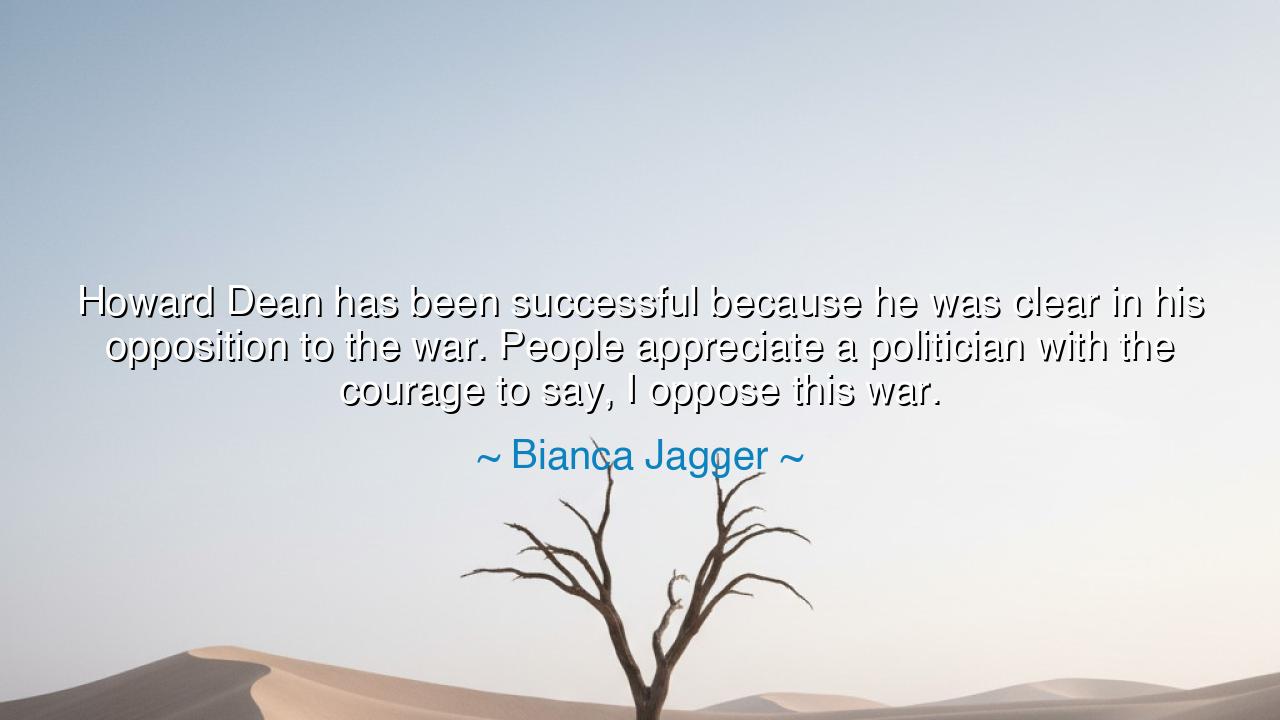
Howard Dean has been successful because he was clear in his
Howard Dean has been successful because he was clear in his opposition to the war. People appreciate a politician with the courage to say, I oppose this war.






“Howard Dean has been successful because he was clear in his opposition to the war. People appreciate a politician with the courage to say, I oppose this war.” Thus spoke Bianca Jagger, a woman of conscience and fierce moral clarity, who has long stood as a voice for justice and peace. In these words, she does not merely speak of politics — she speaks of the eternal virtue of courage, the sacred act of standing for truth when fear and conformity bind the tongues of men. Her praise of Howard Dean was not simply for his political stance, but for his willingness to declare his conviction plainly, without disguise or apology, in a time when silence and compromise ruled the day.
The origin of this quote lies in the early years of the new millennium, when the world had been shaken by war and uncertainty. The United States had entered the conflict in Iraq, and voices of dissent were few and often drowned by the tides of nationalism and fear. Howard Dean, then the governor of Vermont and a candidate for the presidency, became one of the rare figures in American politics to oppose the war openly, unambiguously, and early. Many others, bound by political caution, spoke in riddles or avoided judgment. But Dean stood before the people and said what many in their hearts already knew — that war, born of falsehood and pride, could not bring peace. And because he spoke with clarity and conviction, people listened, and many found courage in his courage.
When Bianca Jagger declared that people appreciate “a politician with the courage to say, I oppose this war,” she touched upon a truth older than nations. For every generation faces its moment of moral testing, when men and women must choose whether to speak truth or to remain silent for comfort’s sake. History’s heroes have always been those who chose truth, even when it cost them dearly. It was Socrates, who stood before his accusers and spoke his conscience rather than betray wisdom; it was Mahatma Gandhi, who defied empire through the power of peaceful resistance; it was Martin Luther King Jr., who thundered against the injustice of war and racism, knowing that his words might hasten his death. In each of these souls burned the same flame — the flame of moral courage, which Bianca Jagger recognized in Dean’s defiance.
To oppose war when the drums of patriotism are beating is no easy thing. For in times of conflict, fear makes virtue seem like treason, and the voice of peace is branded as weakness. But as Jagger reminds us, it is precisely in such moments that courage is most needed. Words spoken in peace are cheap; words spoken in danger are priceless. When Howard Dean said, “I oppose this war,” he broke the spell of consensus, giving permission to countless others to question what they had been told. And in doing so, he reminded a weary nation that democracy dies not from enemies abroad, but from the silence of its citizens at home.
Bianca Jagger’s insight also reveals a deeper yearning in the human spirit — that we are drawn not to perfection in our leaders, but to authenticity. The people do not demand that a politician be flawless, but that he be real, that his words arise from conscience rather than calculation. When she says, “People appreciate a politician with the courage to say,” she speaks for all who long to see integrity restored to the halls of power. For in an age of deceit and spin, clarity itself becomes an act of rebellion. The one who dares to speak truth in plain words — who dares to say “I oppose” — reawakens faith in the possibility of honest leadership.
History, too, bears witness to the power of such courage. Consider Abraham Lincoln, who stood against the tide of his age to declare that slavery was wrong; or Winston Churchill, who warned of the coming storm when others mocked his foresight. They were reviled in their time, yet revered in posterity. Their success was not measured by comfort, but by courage, not by compromise, but by conviction. So too, Jagger reminds us, was Howard Dean’s influence — not because he sought to please, but because he dared to stand alone.
So, dear listener, let this truth take root in your own heart: that clarity and courage are the twin pillars of integrity. Do not be swayed by fear of disapproval or hunger for praise. When conscience speaks, listen — and when truth demands a voice, give it yours. Speak your convictions clearly, as Dean did; defend peace, as Jagger calls us to; and remember that silence in the face of wrong is itself a form of surrender.
For in the end, as Bianca Jagger teaches, courage is not only for the battlefield — it is for the soul. The war she speaks of is not merely between nations, but within each of us — between fear and integrity, between comfort and truth. Choose courage. Choose clarity. And when the moment comes to stand for what is right, say as Dean did, without hesitation or disguise: “I oppose this war.” For in that act of truth, you become not only a defender of peace, but a guardian of the human spirit itself.






AAdministratorAdministrator
Welcome, honored guests. Please leave a comment, we will respond soon